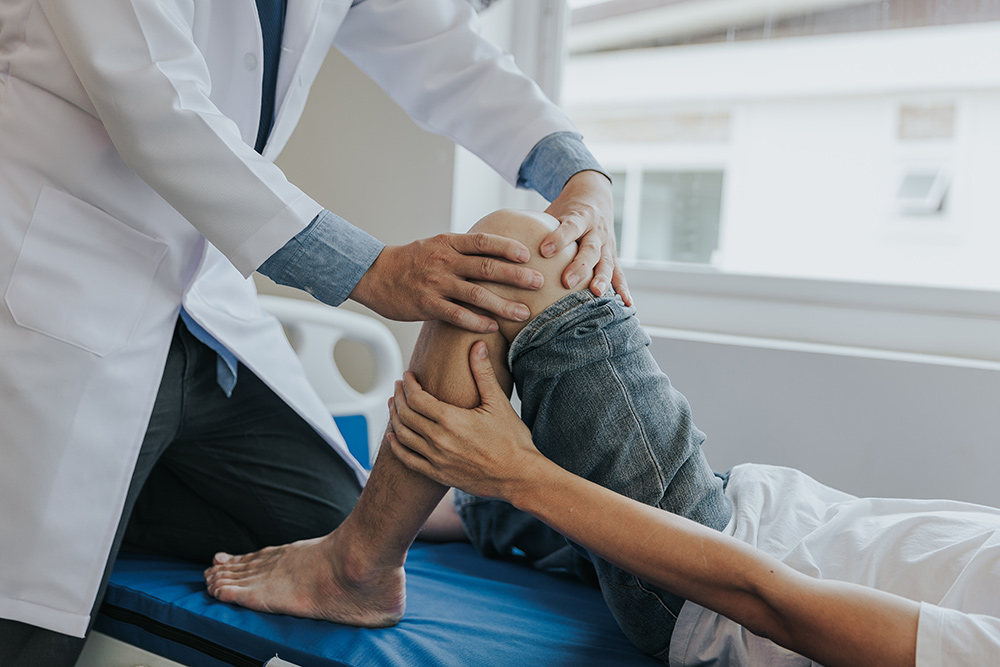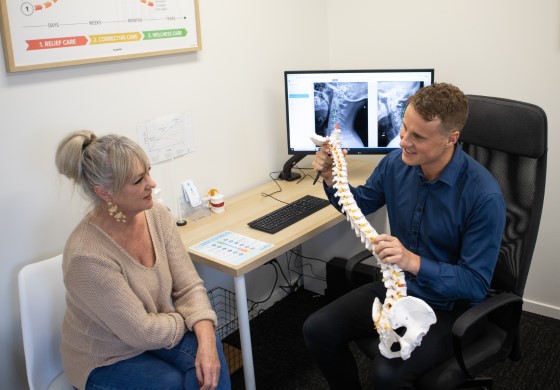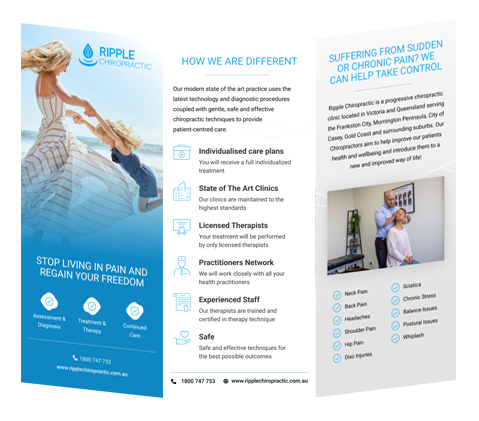Sports Injury Treatment
- Comprehensive History
- Health Goal Setting
- Orthopedic Exam
- Neurological Exam
- Biostructural Exam
- 3D Posture Analysis
- Range Of Motion Exam
- Referral For Diagnostic Imaging
- First Follow Up Treatment
EXCELLENTBased on 109 reviews Trustindex verifies that the original source of the review is Google.
Trustindex verifies that the original source of the review is Google. Helena Annelise2022-05-26All the chiropractors have been so helpful and their reception is friendly and personable! As someone who works 8 hours a day at a desk I am grateful to have them. Truly recommend Ripple if you are in search for a chiro to help your road to recovery. Thanks again!Trustindex verifies that the original source of the review is Google.
Helena Annelise2022-05-26All the chiropractors have been so helpful and their reception is friendly and personable! As someone who works 8 hours a day at a desk I am grateful to have them. Truly recommend Ripple if you are in search for a chiro to help your road to recovery. Thanks again!Trustindex verifies that the original source of the review is Google. Trevor Wyhoon2022-04-29Im normally not one to recommend, but this team is Fantastic!!!. They help you set goals for your care and lead you through them. Great results, cannot recommend them highly enough.Trustindex verifies that the original source of the review is Google.
Trevor Wyhoon2022-04-29Im normally not one to recommend, but this team is Fantastic!!!. They help you set goals for your care and lead you through them. Great results, cannot recommend them highly enough.Trustindex verifies that the original source of the review is Google. Laura Feddersen2022-03-25Ripple chiropractic is like no other I have experienced. The care is 10/10, the investigative work done to understand my issues was thorough. They educated me to understand how I got to this point and how we were going to correct it. I couldn't be happier at Ripple.Trustindex verifies that the original source of the review is Google.
Laura Feddersen2022-03-25Ripple chiropractic is like no other I have experienced. The care is 10/10, the investigative work done to understand my issues was thorough. They educated me to understand how I got to this point and how we were going to correct it. I couldn't be happier at Ripple.Trustindex verifies that the original source of the review is Google. Melissa Parkinson2022-02-16Highly recommend!! My family has been seeing Dr Aleks and the team at Ripple Chiropractic for many months now and we cannot be happier with the level of care and treatment we have received. We have all had amazing results and cannot thank Dr Aleks enough.
Melissa Parkinson2022-02-16Highly recommend!! My family has been seeing Dr Aleks and the team at Ripple Chiropractic for many months now and we cannot be happier with the level of care and treatment we have received. We have all had amazing results and cannot thank Dr Aleks enough.
Sports injuries are common among athletes and active individuals, ranging from minor discomfort to more serious conditions that impact performance and mobility. Chiropractic care provides a non-invasive option for sports injury treatment, focusing on relieving pain, improving range of motion and supporting the body’s natural healing process.
Whether you’ve suffered an acute injury or are dealing with chronic pain from overuse, early treatment is essential to prevent further injury and aid recovery. Discover how chiropractic care can assist in the rehabilitation of various sports injuries, helping you return to your routine safely and effectively.
Understanding Sports Injuries
Most sports injuries occur due to accidents, overuse, or improper training techniques, with the severity of the injury varying depending on the activity and affected body part. Common sports injuries include:
- Sprained Ankle
- Shin Splints
- Hamstring Strains
- Knee Injuries (such as ACL tears)
- Tennis Elbow
- Groin Pull
- Shoulder Dislocation
- Achilles Tendon Rupture
- Fractures
- Rotator Cuff Injuries
In many sports injuries, the initial pain may be mild, but without proper care, the injury can worsen, leading to chronic pain or restricted movement. Seeking chiropractic treatment early can help prevent further injury and promote faster recovery.

A personalised sports injury treatment plan may include spinal adjustments, exercise therapy and soft tissue therapy.
Symptoms and Diagnosis of Sports Injuries
Symptoms of sports injuries vary depending on the type and severity of the injury. In cases of acute sports injuries, you may experience severe pain, swelling and difficulty moving the injured area. Overuse injuries, on the other hand, often cause gradual pain and stiffness that worsens with continued activity. Key symptoms of sports injuries include:
- Severe Pain: Especially following an acute injury such as a sprained ankle.
- Swelling: Often seen in both acute and chronic injuries, indicating inflammation in the injured body part.
- Limited Mobility: Difficulty moving the affected joint or muscle.
- Persistent Pain: If pain persists after initial treatment, it could indicate a more serious issue, such as a worsening overuse injury.
A chiropractor will assess your condition through a thorough physical examination, possibly accompanied by imaging tests like X-rays, to diagnose the extent of the injury and develop an appropriate treatment plan.
Chiropractic Care for Sports Injuries
Chiropractic care is a highly effective treatment option for both acute and chronic sports injuries. By focusing on realigning the spine and improving overall body function, chiropractic adjustments can relieve pain, enhance the range of motion and accelerate the healing process. Whether you’ve experienced an ankle sprain or shin splints, chiropractic care can be tailored to your specific needs.
How Chiropractic Adjustments Help
Chiropractic adjustments target the injured body part by:
- Restoring Alignment: Correcting spinal or joint misalignments caused by sports injuries, allowing the body to heal naturally.
- Relieving Pain: Reducing pressure on nerves and muscles, offering pain relief without medication.
- Preventing Further Injury: By addressing underlying imbalances in the body, chiropractic care helps to prevent sports injuries from recurring.
Stop Living in Pain and Regain Your Freedom
Holistic Approach to Sports Injury Treatment
Chiropractors often adopt a holistic approach to sports injury recovery, offering more than just spinal adjustments. Treatment may include:
- Exercise Therapy: Tailored exercises to strengthen the injured body part and promote a full range of motion.
- Soft Tissue Therapy: Techniques such as massage or stretching to improve blood flow, relax tight muscles and aid in recovery.
- Spinal Adjustments: Correcting misalignments in the spine to improve overall body mechanics and support recovery from injuries.
Rehabilitation for Chronic and Overuse Injuries
Many sports injuries are due to overuse, resulting in chronic pain and stiffness. Chiropractic care plays a critical role in managing these conditions by addressing the root cause of the problem and guiding patients through a rehabilitation program. This may involve:
- Strengthening Exercises: Focusing on the injured area to support proper function and prevent injury recurrence.
- Improving Flexibility: Specific stretches and mobility work to restore the full range of motion and prevent long-term stiffness.
- Lifestyle Modifications: Advice on posture, movement and technique to prevent sports injuries in the future.

Effective sports injury treatment not only helps with recovery but also plays a key role in preventing future injuries.
Benefits of Chiropractic Care for Sports Injuries
Chiropractic care provides numerous benefits for athletes and individuals recovering from sports injuries, including:
- Pain Relief: Chiropractic adjustments and therapies target the source of pain, offering relief without the use of medications.
- Faster Recovery: By promoting proper alignment and improving mobility, chiropractic care can help the injury heal more quickly.
- Prevention of Future Injuries: Chiropractic treatment strengthens the injured area and enhances overall body mechanics, reducing the risk of re-injury.
Why Choose Ripple Chiropractic for
Sports Injury Treatment?
At Ripple Chiropractic, we understand the unique needs of athletes and active individuals. Our comprehensive approach to sports injury treatment is designed to help you recover quickly and safely, whether you’ve sustained an acute injury or are dealing with an overuse injury.
Our experienced chiropractors will create a personalised rehabilitation program to relieve pain, restore mobility and get you back to your favourite activities. Contact us today to begin your journey to recovery.
Individualised care plans
You will receive a full individualised treatment
State of The Art Clinics
Our clinics are maintained to the highest standards.
Licensed Therapists
Your treatment will be performed by only licensed therapists
Practitioners Network
We will work closely with all your health practitioners
Experienced Staff
Our therapists are trained and certified in therapy technique
Safe
Safe and effective techniques for the best possible outcomes.
How to Schedule an Appointment
If you want to schedule an appointment to see a chiropractor for car accident injury treatment, you can give us a call on (03) 9864 1819 or you can fill out our online booking form.
FAQs
If you have any more questions about sports injury treatment, please don’t hesitate to contact us today. In the meantime, check out our most frequently asked questions below which may provide the additional information you’re looking for.
What should I do immediately after a sports injury?
For minor injuries, it’s important to act quickly to reduce swelling and prevent further damage. The recommended approach is Rest, Ice, Compression, Elevation (RICE), which helps manage pain and inflammation in the injured area.
How do I know if a sports injury is getting worse?
If you notice increasing pain, swelling, or reduced mobility, it may indicate that the injury is getting worse. It’s important to monitor any changes and seek professional treatment to avoid long-term damage.
Can chiropractic care help with recurring sports injuries?
Yes, chiropractic care can be highly beneficial for recurring sports injuries. By addressing the root cause of the injury, such as misalignments or muscle imbalances, chiropractic adjustments and therapies can help prevent future injuries and improve overall body function.
How long does it take to recover from a sports injury?
Recovery time depends on the severity of the injury and the treatment approach. Minor injuries may heal within a few weeks, while more serious injuries may require a longer rehabilitation program. Early treatment and following your chiropractor’s recommendations can speed up recovery.
General Information Disclaimer: The content provided here is for informational purposes only and is not intended as medical advice, diagnosis, or treatment. Always seek the advice of your health professional with any questions you may have regarding a medical condition. The information on this site is general in nature and may not reflect current medical developments or research. Your reliance on any information provided by this site is solely at your own risk.
Grab Our New Patient Offer Today
Consultation + 1st Treatment

We are offering a special price for your consultation + 1st treatment which will include all of the following:
- Comprehensive history including chief complaint, trauma and medical history.
- Health goal setting
- Orthopedic exam
- Neurological Exam
- Biostructural Exam
- 3D posture analysis
- Range of motion exam
- Referral for diagnostic imaging if clinically appropriate
- First follow up treatment


